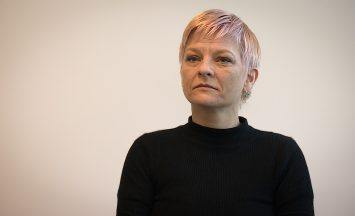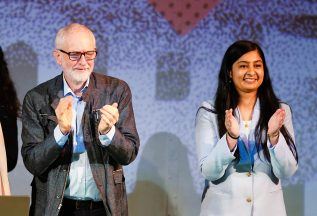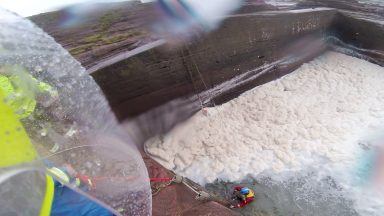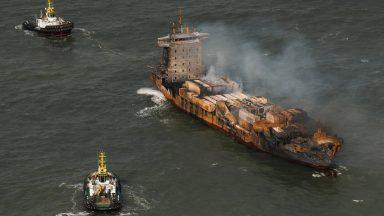A baby boy was diagnosed with a one-in-a-million condition after a doctor commented on the size of his head during an appointment for an unrelated issue.
Conor O’Rourke, now three, was treated for vein of galen malformation (VOGM) with a new surgical technique by specialists at Alder Hey Children’s Hospital in Liverpool in what is thought to be a world-first.
The condition – which affects roughly 10 to 12 babies in the UK each year – causes the veins and arteries in the brain to connect abnormally, increasing blood flow and leading to severe complications if undetected.
Conor was one of a rare subgroup of patients, meaning the usual treatment did not work.
His mother Lucy O’Rourke, 36, from Bolton, described the last couple of years as an “out of body experience” for her and husband Sean O’Rourke, 38.
She told the PA news agency that Conor was around eight or nine months old when she took him to an appointment for a potential umbilical hernia, a usually harmless condition when the intestines bulge through the opening in muscle near the belly button.
She said: “He was looking at his belly button, and then suddenly wanted to ask me questions about his head.
“And obviously I was slightly confused at that point. I didn’t really know what the issue was, I’m just looking at my beautiful baby, and didn’t think that there was an issue.”
Mrs O’Rourke said the consultant asked about the shape of her son’s head, adding: “He felt like he had quite a pronounced forehead; it was quite a large head.
“And he had very visible veins on his forehead, and his temples, around his eyes. And we had seen those things, but obviously we didn’t in a million years think that there was something sinister going on.
“We thought he was very fair-skinned, and that was why we could see his veins.
“Looking back now, I look at pictures, and I think, ‘oh yeah, you can sort of see now’, knowing what we know. But in that moment in time, I was a new mum, first-time mum, didn’t really spot anything untoward, really.”
Mrs O’Rourke said that at the time of the appointment, Conor had not yet sat up on his own but had met all his other milestones.
She was warned to take her son to A&E if he suddenly started vomiting or was difficult to rouse after sleeping, although she was reassured it was probably nothing to worry about.
However, Mrs O’Rourke said the conversation played on her mind, and she called her GP the following day.
Conor was sent for an MRI in March 2023 and the couple were not worried until they were called into a family room.
At that stage, doctors did not know what was wrong with Conor but told the family he had a “significant brain issue” that would require surgery.
The results were assessed by specialists at another hospital, with more scans ordered for Conor.
“It was only after those scans that they said to us that they think that it’s vein of galen malformation and then started to explain to us a little bit what that meant,” Mrs O’Rourke said.
“But in reality, they’d never seen it before in Bolton.”
Mrs O’Rourke said the experience was “terrifying” and the couple felt “helpless”.
“Throughout the whole of this, really, it’s definitely been a bit of an out of body experience,” she told PA.
Conor was sent to Alder Hey and had three operations called endovascular embolisations, which involves inserting a small, flexible tube called a catheter into the arteries, usually from the groin.
Medics use X-ray imaging to guide the tube through the body and into place, and then inject a glue-like substance to block off the artery.
In some cases, the same procedure can be performed by inserting the catheter into the veins.
However, Conor is one of a rare subgroup of patients where veins block off and doctors can no longer get to the malformation.
When this happens, the jugular veins – a set of major blood vessels in the neck – also block off, causing the veins from the brain to try and drain elsewhere.
According to the toddler’s surgeon, Conor Mallucci, this was causing swelling and damage to the toddler’s brain stem and spinal cord, leading to him to deteriorate.
Mr Mallucci told PA: “It’s a fight against time, and that happened quite early in Conor, which is why we had to come up with this alternative route.”
The operation involved accessing the malformation through Conor’s skull to target the affected blood vessels.
He recovered well and is now considered “99% cured” by Mr Mallucci.
Mrs O’Rourke said the family feels lucky in some ways. She said: “As much as I feel like this is an incredibly unlucky diagnosis, I sometimes have to pull that back and think actually we were incredibly lucky in a lot of ways.
“We were already under a consultant at Royal Manchester Children’s, who mentioned something.
“And then we were also incredibly lucky, in a way, that I’m very much an over-thinker, and I was an anxious mum, to not leave it there.
“And thank goodness that we did. Because if we didn’t, I don’t know where we would actually be.”
Conor recently graduated from nursery and will be attending pre-school with his peers in September.
Mrs O’Rourke said she is “so proud” of her “resilient” son, adding: “At one point they were saying, ‘we may want to hold him back’ and ‘maybe it might be a bit too much for him’. But they’ve said now that they think he’s doing incredibly well.
“That’s brilliant. And it was just magical to see him.”
Mr O’Rourke has also committed to running the Manchester Marathon next April to raise money for Alder Hey.
“Thank you just doesn’t cut it,” Mrs O’Rourke said. “They not only saved his life, they saved ours too.”
Follow STV News on WhatsApp
Scan the QR code on your mobile device for all the latest news from around the country


 iStock
iStock

























